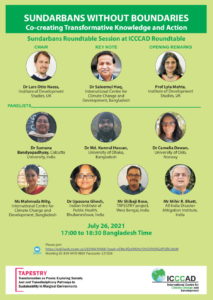
- This event has passed.
SUNDARBANS WITHOUT BOUNDARIES: Co-creating Transformative Knowledge and Action
Sundarbans Roundtable Session at ICCCAD Roundtable
26 July 2021
Co-hosted by the International Centre for Climate Change and Development (ICCCAD) and the TAPESTRY project.
This roundtable discussed the possibilities and results of transboundary research in the Indian and Bangladesh Sundarbans. Speakers shared views from their work on the nature and extent of boundaries; and how transboundary research can lead to transformative knowledge and action around gender, livelihoods, and natural resource management. Innovative research methods—including PhotoVoice and digital photo diaries — offered visual context.
speakers

- Dr Lars Otto Naess, Institute of Development Studies, UK (chair)
- Prof Lyla Mehta, Institute of Development Studies, UK
- Dr Saleemul Huq, International Centre for Climate Change and Development, Bangladesh
- Dr Sumana Bandyopadhyay, Calcutta University, India
- Dr Md. Kamrul Hassan, University of Dhaka, Bangladesh
- Dr Camelia Dewan, University of Oslo, Norway
- Ms Mahmuda Mity, International Centre for Climate Change and Development, Bangladesh
- Dr Upasona Ghosh, Indian Institute of Public Health, Bhubaneshwar, India
- Mr Shibaji Bose, TAPESTRY project, West Bengal, India
- Mr Mihir R. Bhatt, All India Disaster Mitigation Institute, India
About the Roundtable
The Sundarbans remain one of the most complex and vulnerable areas in South Asia and an area where multiple socioecological challenges converge. It brings together issues such as sea level rise; delta management; collaborative role of India and Bangladesh in adaptation measures; large scale displacement; adaptive livelihood; and managed retreat. However, as this delta area is divided between India and Bangladesh, the action and research initiatives remain partial and recommendations become fractured. One way to address these challenges is to find ways to co-create studies on Sundarbans across the national boundaries, so that transformative knowledge and action become possible in one of the most important locations in South Asia.
The aim of this roundtable is to share insights from recent and ongoing work both in the Indian and Bangladesh Sundarbans. The session is informed by the TAPESTRY project, which has over six years of experiences of action research around uncertainty and transformation, with a focus on livelihood and gender, in the Sundarbans delta. Co-creation of knowledge with researchers by local leaders blur the boundaries—geopolitical and knowledge and ecological—between the two parts of Sundarbans delta. As there are as many similarities as there are dissimilarities, the ongoing collaborative research work explores multiple Sundarbans, simultaneous economic and ecological influences, as well as various ways these influences are interpreted our contextualised by local and non-local individuals. Ultimately, the project seeks to understand and help support emerging ‘patches’ of transformations, working with local partner institutions for transformative knowledge and action.
The panel will share views from their work on the nature and extent of boundaries; and how transboundary research can lead to transformative knowledge and action around gender, livelihoods, and natural resource management. Innovative research methods—including PhotoVoice and digital photo diaries—will offer visual context from the Below to the participants. The roundtable will seek to generate insights on how transformative and transboundary knowledge helps unearth relations—social and economic and ecological—that are otherwise frozen in time between boundaries. This is especially urgent now in view of increasing vulnerabilities and risk due to climate change, frequent high extreme cyclonic events, and rapid ecological degradation and loss of habitats. The roundtable is facilitated by ICCCAD, which is a leading international research organisation rooted in Bangladesh and leads work on local leadership in adaptation.
The TAPESTRY project includes IDS (UK), AIDMI, IIT Bombay, NMBU and NIVA (Norway), Kyoto University (Japan), Caritas, and nine local organisations in India and Bangladesh.